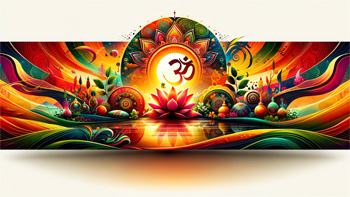Hinduism, one of the world's oldest religions, originates from the Indian subcontinent and forms a significant part of its cultural and spiritual identity. It's a complex, polytheistic religion with a rich tapestry of myths, gods, and practices. Unlike many other religions, Hinduism does not have a single founder, a specific theological system, or a single system of morality, making it uniquely diverse and inclusive.
The origins of Hinduism can be traced back to the ancient Indus Valley Civilization, around 2000-1500 BCE. Over the centuries, it absorbed and assimilated a variety of cultural influences, both indigenous and foreign, evolving into the religion we know today. The religious texts of Hinduism, primarily written in Sanskrit, include the Vedas, the Upanishads, the Mahabharata, the Ramayana, and the Puranas, among others.
Core Beliefs of Hinduism
Hinduism is characterized by a diverse range of beliefs, but several core principles unite this multifaceted religion. One of the fundamental concepts is the belief in Brahman, the ultimate reality or universal soul. This supreme existence is present in every aspect of the universe and every living being. Hindus also believe in the doctrine of samsara, the cycle of birth, death, and rebirth, influenced by one's actions or karma. The ultimate goal of a Hindu's life is to achieve Moksha, the liberation from this cycle and union with Brahman.
Another key aspect of Hindu belief is the concept of dharma, or duty, which dictates the ethical and moral life one should lead. It varies depending on one's age, caste, gender, and social position. The practice of yoga and meditation are also central to Hinduism, seen as paths to spiritual growth and liberation.
Hindu Deities and Worship
Hinduism is known for its pantheon of gods and goddesses, each symbolizing various aspects of life and the universe. The three principal deities in Hinduism are Brahma the Creator, Vishnu the Preserver, and Shiva the Destroyer. However, these deities are not separate entities but rather different aspects of the same ultimate reality, Brahman.
Devotional worship, or Bhakti, plays a significant role in Hinduism. Worship practices vary widely and can include rituals like prayer, offerings, fasting, and pilgrimages. Temples are the focal points of Hindu worship, but many devotees also maintain shrines in their homes.
Hindu Festivals and Celebrations
Hinduism is rich in festivals and celebrations, each with its own significance and traditions. Diwali, the Festival of Lights, celebrates the victory of good over evil and knowledge over ignorance. Holi, the festival of colors, marks the arrival of spring and the triumph of good over evil. Navaratri, a nine-night festival, honors the Divine Feminine, and is celebrated with fasting, dance, and music.
These festivals not only have religious significance but also play a crucial role in community bonding and cultural preservation. They are celebrated with great enthusiasm, marked by rituals, prayers, music, dance, and feasting, making them a vital aspect of Hindu cultural identity.
Hinduism's Influence on Society and Culture
Hinduism has significantly influenced Indian society and culture. Its teachings on dharma and karma have shaped the moral and ethical framework of Indian life. The caste system, although now legally abolished, was historically influenced by Hindu dharma concepts, impacting social structure and hierarchy.
Art, literature, music, and dance in India are profoundly imbued with Hindu themes and stories, evident in classical dance forms like Bharatanatyam and Kathak, and in the Indian film industry. Hindu architectural styles are also prominent in India's many temples, which are not only places of worship but also marvels of ancient architecture and art.
Hindu Philosophy and Global Influence
Hindu philosophy, with its emphasis on tolerance, plurality, and the interconnectedness of all life, has had a global impact. In recent years, practices like yoga and meditation have gained immense popularity worldwide, transcending religious boundaries and being embraced for their physical, mental, and spiritual benefits.
The universal appeal of Hindu philosophy lies in its adaptability and relevance to contemporary life. It offers a pathway to personal spiritual growth while advocating for a life of duty, righteousness, and respect for all living beings.
Hinduism, with its deep philosophical roots and diverse range of practices, is more than just a religion. It's a way of life that continues to evolve and adapt, influencing and enriching not only those who follow it but also the global cultural landscape.
